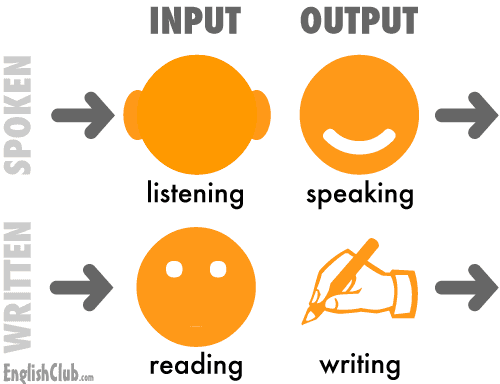01The spelling of William Shakespeare's name has varied over time. Sources from William Shakespeare’s lifetime spell his last name in more than 80 different ways, ranging from “Shappere” to “Shaxberd”. In the handful of signatures that have survived, the Bard never spelled his own name “William Shakespeare,” using variations or abbreviations such as “Willm Shakp,” “Willm Shakspere” and “William Shakspeare” instead. However it’s spelled, Shakespeare is thought to derive from the Old English words “schakken” (“to brandish”) and “speer” (“spear”), and probably referred to a confrontational or argumentative person.
02In the English language the combination "ough" may be pronounced in nine different ways. The following sentence contains them all: "A rough-coated, dough-faced, thoughtful ploughman strode through the streets of Scarborough; after falling into a slough, he coughed and hiccoughed."
03There is a completely unique English dialect spoken only on Tangier Island, Virginia. It is said to be almost the same as when the island was settled in 1686 and can be unintelligible even to native English speakers.
04According to the US company Global Language Monitor (GLM) a new word in the English language is created about every 98 minutes.
The English language is likely to contain the most words of all languages, according to the Oxford English Dictionary, and estimates for the number of words range from one to two million.
05Before the year 1000, the word “she” didn’t exist in the English language. The singular female reference was the word "heo," which also was the plural of all genders. The word "she" didn't appear until the 12th century, about 400 years after English began to take form. "She" probably derived from the Old English feminine "seo," the Viking word for feminine reference.
06The word “impossible” dropped in literary use by 50% over the course of the 20th century
07“The sixth sick sheik’s sixth sheep’s sick” is listed by the Guinness Book of Records as the hardest tongue twister in the world.
08The word “like” can be used as a noun, verb, adverb, adjective, preposition, particle, conjunction, hedge, interjection, and quotative.
09Aoccdrnig to a rscheearch at Cmabrigde Uinervtisy, it deosn’t mttaer in waht oredr the ltters in a wrod are; the olny iprmoatnt fatcor is taht the frist and lsat ltteres be at the rghit pclae. The rset can be a total mses and you can sitll raed it wouthit a porbelm. Tihs is bcuseae the huamn mnid deos not raed ervey lteter by istlef, but the wrod as a wlohe.
Or
According to a research at Cambridge University, it doesn’t matter in what order letters in a word are written;. the only important factor is the the first and last letters be in the right place. The rest can be a total mess and you can still read it without a problem. This is because the human mind does not read every letter by itself but the word as a whole.
10For more than a century, the English aristocracy couldn’t speak English. William the Conqueror tried to learn English at the age of 43 but gave up. He didn’t seem especially fond of the land he had conquered in 1066, spending half of his reign in France and not visiting England at all for five years when in power. Naturally, French-speaking barons were appointed to rule the land.
Within 20 years of the Normans taking power in England, almost all of the local religious institutions were French-speaking. The aristocrats brought with them large retinues and were followed by French tradesmen, who almost certainly mixed bilingually with the English tradesmen. In turn, ambitious Englishmen would have learned French to get ahead in life and mix with the new rulers. Around 10,000 French words entered English in the century after the Norman invasion. There is little to suggest that aristocrats themselves spoke English. It isn’t until the end of the 12th Century that we have evidence of the children of the English aristocracy with English as a first language. In 1204, the English nobility lost their estates in France and adopted English partly as a matter of national pride.
11One man is credited as being largely responsible for the differences between American and British spelling. Noah Webster, born in West Hartford, Connecticut in 1758, believed that a great emerging nation such as the USA needed a language of its own: American English. Webster found the English in the textbooks of the time to be corrupted by the British aristocracy, with too much French and Classical influence. He was to write American books for American learners, representing a young, proud and forward-thinking nation. Between 1783 and 1785, he produced three books on the English language for American schoolchildren. During his lifetime, 385 editions of his Speller were published.
The modern US spelling of color was initially spelt in the British way, colour, but this changed in later editions. Other differences include the US spelling of center as opposed to the British centre, and traveler instead of traveller. Webster wanted to make spelling more logical, as befitting a nation that was founded on progressive principles. This is a rare example of a dictionary writer trying to lead the English language instead of describe it.


